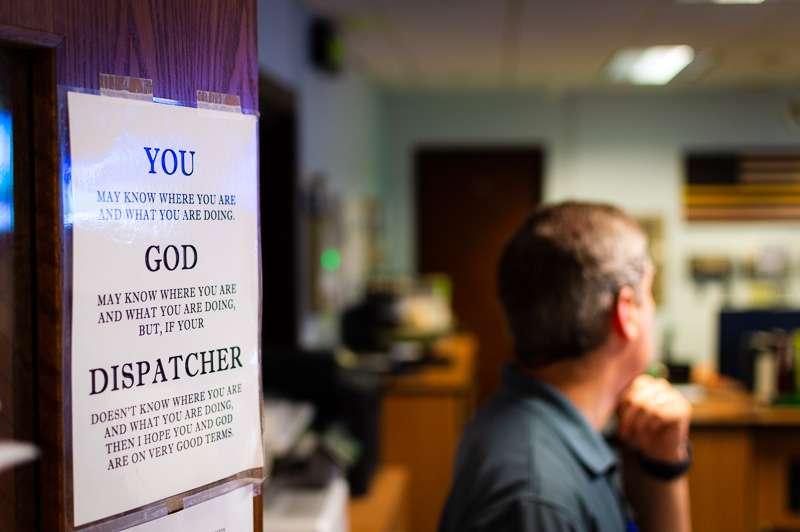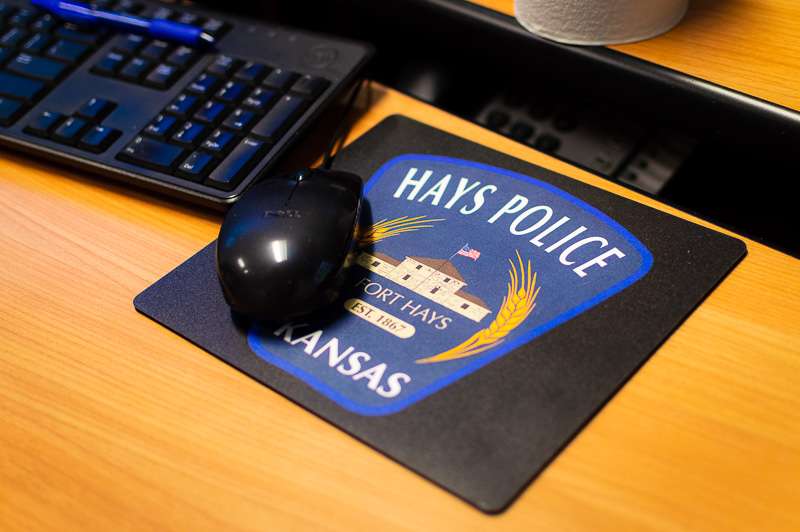
By JAMES BELL
Hays Post
Working in law enforcement can be a thankless job, with numerous challenges including long hours, overnight shifts and dealing with residents in their most difficult moments.
But even the biggest supporters of law enforcement can easily overlook a group of professionals that are at the forefront of every incident – dispatchers.
This year during National Public Safety Telecommunicators Week the Hays Police Department is working to showcase and offer thanks to the hard-working men and women that are the true first, first responders.
“Every year during the second week of April, the telecommunications personnel in the public safety community are honored,” according to the APCO. “This week-long event, initially set up in 1981 by Patricia Anderson of the Contra Costa County Sheriff’s Office in California, is a time to celebrate and thank those who dedicate their lives to serving the public.”
“This is their week and while they are very important every day, we make an extra special effort this week to make them feel important and to recognize that,” said Don Scheibler, Hays chief of police.
He said the job can often be thankless and very unforgiving.

“They are that first call, that first relay point on a good majority of the incidents that are handled by the different agencies,” said Jeff Ridgway, communications lieutenant.
The HPD has overseen the department since it was transferred back to HPD control at the end of 2019, but continues to service law enforcement agencies in Ellis County along with fire departments and Ellis County EMS.
“It really is just a great staff,” Ridgeway said. “I have been impressed since day one. They all have a heart to serve, and they do the best they can, I really believe that.”
They also frequently work with other agencies as needed.
“It is definitely not just an Ellis County center by any regards,” Ridgeway said. “We are willing and able to go past those county lines.”
And despite the often stressful and difficult work, many stay in the position for the long term.
“There are some down there that are quickly approaching over a decade,” Scheibler said.
He said the leadership in the department, including many of those long-term employees make a significant impact on the department’s operations.
“Those leads are truly the backbone of that group down there,” Scheibler said. “It is a very stressful job and their willingness to stay and do that work is greatly appreciated.”
That dedication to the position also speaks to the quality of the staff he said.
“When chaos is going on in our community, they are the calm voice on the radio, directing people where to go and how to get to the resources where they need to be at,” Scheibler said.
Helping people navigate through difficult situations is not limited to civilians, he said. The dispatchers can also have a very real impact on the situation by being guiding officers in difficult situations.

“Even officers get excited,” Ridgeway said. “And having that calm command and control on the radio can help the officers calm down,” Ridgeway said.
“They have the ability to control our response,” Scheibler said. “In a world where we talk about concern of officers overreaction, dispatch can set the tone for the call.”
He said the professionalism of their staff, makes a difference in the whole department.
“They are responding and giving that information out in a calm and professional manner,” Scheibler said. “It really helps the officer slow down, settle down and give that proper response.”
“One of the challenges that law enforcement has, is they get tunnel vision,” Ridgeway said. “Those dispatchers are huge about letting them calm down and get that adrenaline relaxed and pulled back down a little bit to get out of that.”
But that too can leave a lasting impact on the dispatchers.
“They know their people, they know the tone of their voice, and when the officer needs assistance they are able to hear those things, all that wears on you,” Scheibler said.
Even with the amount of professionalism in the department he said stress can take a toll.
“One of the challenging things about this profession – especially that dispatch center – is the ongoing stress that any time the phone could ring, and you could have somebody’s life in your hands and how you respond, how you handle that call can have lasting impacts,” Scheibler said.
With the frequent stressful situations the communications staff encounter, Ridgeway said mental health is an ongoing area of concern that the department works to ensure is mitigated as much as possible with their inclusion into HPD support systems.
“I think they are truly a valuable resource and we have made an investment into those people and we have to protect that investment,” Scheibler said.
But even with those systems in place, it takes a special kind of person to be a dispatcher.
When hiring a dispatcher, Scheibler said they look for “a person that is professional, a person that is passionate about their job, a desire to help people, a desire to improve themselves and attempt to get better as a communications officer so that they can better serve people, compassion and the ability to show empathy for people. We are very fortunate we have a great staff down there that do a great job. They have the ability to maintain control under some of the most stressful situations you can imagine.”
And even with the changes in the department’s leadership over the last year, and the difficult situations presented by COVID-19, the dispatchers have handled it all in stride.
“Whatever we throw at them, they take it and they run with it,” Scheibler said. “That speaks volumes to their professionalism, and I can’t stress enough how grateful I am for their hard work and their dedication and their willingness to do these things to protect the community.”







